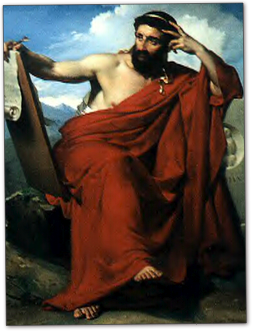



Between 750 and 600 B.C., there was a strong presupposition of equality in Greek communities. So, what were the origins of these aristocratic families? In the late dark ages prowess in war was considered the most excellent quality that men could have (arête). Some men gained great prestige through military accomplishments. These men were called aristoi. Since the best soldiers tended to obtain more loot, their families became richer than the other families. They got the largest share of any new lands. Since the aristoi had the largest land holdings, they had surplus wealth to lend to the other farmers. If the farmers who borrowed from the aristoi were unable to repay the loans, the lender might either take the borrower's land, or the borrower might be forced into slavery until the debt was paid.

Thus, the aristoi became even wealthier. These same wealthy families came to have great political power. Their wealth gave them leisure time which was necessary in order to hold the political positions of the polis, as magistrates and council members, they controlled the policies of the polis. The aristocrats became a distinct and elite class within the polis. The aristocrats had more leisure time and more wealth. Which they used to take greater advantage of the fruits of trade with the outside world. They associated with each other. They engaged in intellectual activities such as listening to poets, and discussions about epics, philosophy and warfare, and improving their military skills. The aristoi developed a “class consciousness.” that is, they began to see themselves as a group set apart from, and superior to, other citizens, not because of their wealth, but because of some special quality which they alone had. They developed family trees which emphasized that their family had been founded by some mythical hero or god. They told stories that emphasized their importance and power, and they controlled their communities.
But, as we will see, their control over many greek communities was fairly short lived. The strong presumption of equality, and changes in the economic and social structures within the polis, made it impossible for any one class within the community to exercise complete control.
Tyrants and Reform
The high-handed manner in which the aristoi treated the people caused a great deal of discontent among the lower classes. Some members of the aristocratic class began to support reform. But since the aristoi had a stranglehold on the government of the polis, it was difficult to use the traditional means of legislation to pass reform laws.
So the individuals promised reform used violent means to gain their aims. They took control of the polis. In this way the rule by an aristocracy was replaced by rule by a tyrant. Tyrants usually were themselves aristoi, who used the broad power base of popular support to defeat their fellow aristoi and gain personal power. Although tyrants gained control of the polis in order to pass reforms, they sometimes became brutal and absolute as time went on. This would usually cause the people, usually led by the to rebel against the tyranny. The new form of government would vary. In most cases the new government would be, to some extent, democratic.

Technically Solon (above) was not a tyrant, but he ruled Athens as sole Archon for one year in order to reform the Athenian constitution.
